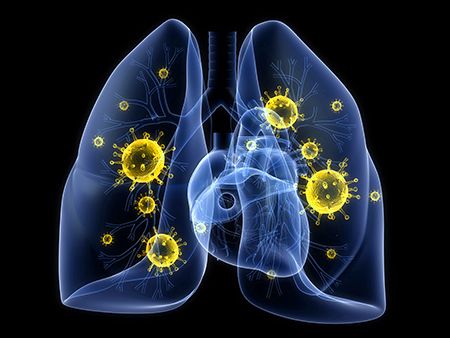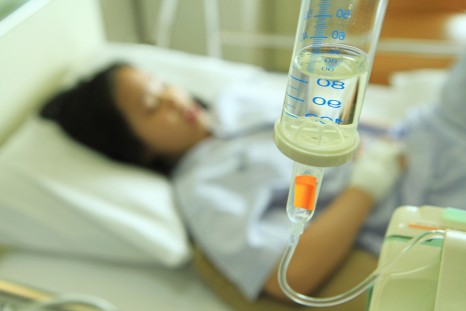 The infection of lungs that is caused by bacterial pathogens is usually referred to as bacterial pneumonia. Individuals who suffer from this condition usually complain of significant discomfort in the throat, fever, persistent cough and pain in the chest, copious mucus production and shortness of breath.
The infection of lungs that is caused by bacterial pathogens is usually referred to as bacterial pneumonia. Individuals who suffer from this condition usually complain of significant discomfort in the throat, fever, persistent cough and pain in the chest, copious mucus production and shortness of breath.
It is imperative to mention that some patients may not experience all the symptoms of bacterial pneumonia listed above; which is why clinical signs and radiological investigation is very important. Bacterial pneumonia in children and old age people can lead to even more dangerous consequences, and can cause major health issues as a result of weaken immune system.
What Causes Bacterial Pneumonia?
The most common type of pneumonia is community-acquired pneumonia which is usually acquired from the community settings or outside of health care venues like hospitals and dispensaries.
The bacterial pneumonia is usually caused by Streptococcus pneumoniae in U.S, and is mostly reported after you had a trivial but poorly managed flu or cold infection. Bacterial pneumonia mostly affects the lower lobe of the lungs. Other major bacteria that cause bacterial pneumonia include Haemophilus influenzae, Mycoplasma pneumonia (primary causative agent of walking pneumonia that is very common in the adults under the age of 40 years), Chlamydia pneumonia and Legionella pneumoniae.
There is another variant of bacterial pneumonia that is referred to as hospital-acquired pneumonia that usually affects the people who are admitted in the hospital for the management of another health issue. The cause of this infection is usually impaired immunity and low host-defenses. It is important to mention that such bacterial pneumonias are more serious because of low immunity and high risk of bacterial resistance to antibiotics. Even the patients who get medical care in hospitals are at risk because the oxygen and ventilators there have direct contact with contaminated machines used by other patients.
Is bacterial pneumonia contagious?
The contagious nature of bacterial pneumonia is variable depending on the type of bacteria that cause this condition. Most bacterial pneumonias are not highly contagious but some exceptions exist such as walking pneumonia by Mycoplasma pneumoniae and tuberculosis. They can be easily spread among individuals through breathing or coughing and sneezing.
Symptoms of Bacterial Pneumonia
Bacterial pneumonia does not have clear-cut symptoms. However, old people are more vulnerable to it, especially those over 65-year old. The bacterial pneumonia usually starts with normal respiratory tract infections in upper part of lungs, along with flu and fever.
Symptoms that usually occur before the onset of bacterial pneumonia includes:
- Coughing is usually severe with frequent production of thick, often clear or yellowish white, sputum or mucus. In severe case, the sputum may be rusty and green due to altered blood in it.
- Fever and cold may happen but are less common in older adults
- Body shakes and chills leading to teeth chattering
- Shortness of breath or breathlessness
- Chest pain is usually a result of extreme coughing and may cause difficulty in breathing as well
- Fast heartbeat, also referred to as tachycardia in medical terms, and palpitation
- Tiredness and weakness
- Nausea along with vomiting and diarrhea
Bacterial Pneumonia in Children
The symptoms of bacterial pneumonia are more noticeable in young children. Older adults usually present with mild or no fever, or coughing with less or no mucus. The symptoms of bacterial pneumonia are different for children of different age groups.
- Symptoms in children under 1 month of age include weakness or lethargy, poor feeding, fever, or grunting.
- Symptoms in older children are the same as adults. They mostly have cough and difficulty in breathing.
- Children might also face these symptoms in case they have bronchitis, tuberculosis or COPD.
So, the suggestion here is to always consult your doctor and confirm the disease before following any remedies by yourself.
When to See a Doctor
It is highly recommended to see a doctor if you are experiencing signs of severe infection such as difficulty in breathing, pain in the chest, fever more than 102°F and continuous coughing.
People with bacterial pneumonia and one of the following conditions should see a doctor as soon as possible to avoid severe consequences:
- Children under 2 years of age
- People over the age of 65
- People with weak immune system and existing serious health issues
- People going through a medical procedure especially chemotherapy
- Those who are taking medications that weaken the immune system in any way
- Individuals with heart failure or lung disease
How Is Bacterial Pneumonia Treated?
1. Medications
Medications are the first agents that people use to treat bacterial pneumonias, which may include:
- Antibiotics: In some cases antibiotics work wonders but in some cases, there may be few effect. You must find the actual cause of infection. This helps in choosing the best suitable antibiotic according to the causative agent.
- Fever reducers: Doctors also suggest fever reducers in case of high fever. These include medications such as aspirin, ibuprofen and acetaminophen.
- Cough medicines: These agents help in managing sore throat and other discomforts by reducing the continuous coughing. Basically, it does not eliminate the cough completely but helps in loosening and moving the fluid present in the lung spaces.
2. Hospitalization
Hospitalization is highly advised in these situations:
- Patient over 65 years old
- Patient gets confused about things including time, people, places, etc.
- Patient with decreased blood pressure and infrequent breathing
- When breathing assistance is needed
- When body temperature drops phenomenally
- Heart rate decreases and drops below 50 BPM
3. Intensive care is required if:
- Patient’s age is less than 2 months
- Patient develops excessive sleepiness
- Patients with serious trouble in breathing
- Temperature drops and get lower than normal
- Oxygen level in bloodstream drops and dehydration happens
